Teheran Street, the boulevard that runs through Samseong-dong in southern Seoul, is the mecca for Korean and global IT companies based in Korea. Just south of there lies the new Campus Seoul, a habitat for startups opened by Google on May 8, its first in Asia and only its third in the world, after ones in London and Tel Aviv.
Campus Seoul (www.campus.co/seoul) occupies the second basement floor in the Autoway Tower. It consists of offices for startups, 17 meeting rooms, a multipurpose room with a stage, a lecture room used for training and education, a device lab in which developers can test their prototypes and a cafe with free Internet. All the spaces are open around the clock. The cafe, in particular, is open to everyone who signed up online for Campus Seoul, entrepreneurs and hopefuls alike.
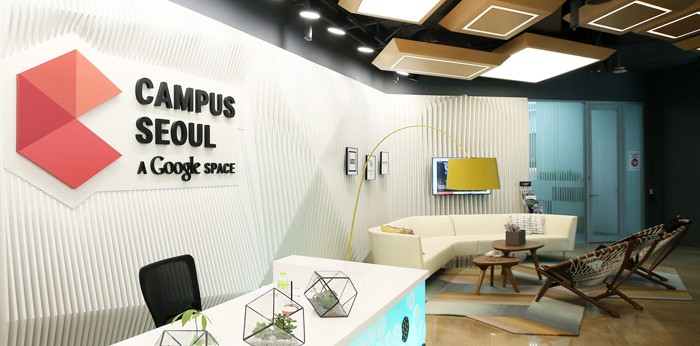
Google’s Campus Seoul is a habitat for startups.
Google decided to open a campus in Seoul due to Korea’s highly dynamic startup community combined with Google Korea’s infrastructure that can provide various mentoring and educational services. Also, there is high potential for local startups to grow through Google’s global network and diverse range of programs.
Over 1,000 entrepreneurs and hopefuls with 28 different nationalities have already signed up for Campus Seoul. Eight startups have already moved into the space. Among them, Venticake develops the smartphone app Retrica, a real-time camera filter. Another company, ChattingCat, developed an online platform that helps write in English.
These companies use the offices for a low cost, as each person pays only KRW 90,000 per month. The campus includes a shower room and a kitchen to help employees at the startups work long hours, sometimes overnight. Most of the eight live-in companies are IT firms and need to use data servers. Campus Seoul provides up to USD 100,000 worth of credit to each startup to help them use data servers.


‘Campus Seoul has a pleasant work environment as well as a kitchen and a shower room. These help employees at the startups work long hours, and sometimes overnight.
What is more important than the physical environment and support is the huge potential for knowledge-sharing and networking at Campus Seoul. In the office, there are few partitions, so people can openly communicate with each other, making networking easier. Campus Seoul also holds many different events in which people can naturally meet others who might help their business. Entrepreneurs can gain useful information on how to start a business, as various seminars and educational programs are often held on the campus. Another advantage to being on the campus is that Google helps these startups enter overseas markets and form global networks.
There is also something for young mothers. The “Campus for Moms” is designed for female entrepreneurs and will start in June. The program is designed to help mothers who cannot take part in traditional startup community activities due to their childrearing duties. In fact, 22 percent of Campus Seoul’s members are female. The program consists of lectures on how to start a company, ranging from product and business development through marketing and fundraising. On the day of the program, colorful rubber mats will be laid on the floor of the multipurpose room so that babies and toddlers can play while the mothers learn how to promote their new companies, all while leaning on the large cushion chairs.
“Our goal is to create a startup community,” said Jeffrey Lim, head of Campus Seoul. “In addition to providing office space, we intend to create an ecology in which various professionals, including entrepreneurs, can grow.”
Please take a look at some of the companies growing at Google’s Campus Seoul.
Rainist (www.rainist.com)
Rainist started an online financial service called BankSalad in 2013. It is designed to analyze various financial products, which are often very complicated, and recommend optimal products for customers. The company analyzed 2,500 Korean credit and debit cards and their 250,000 benefits through a computer simulation. According to the company, 500,000 people used the service in 2014. The company has nine employees, including CEO Kim Tae-hoon, and has already made a profit.
Rainist CEO Kim Tae-hoon says his company’s BankSalad service analyzes various financial products and recommends optimal products for customers.
Kim decided to start his own company after graduating from Sogang University with a degree in business administration.
“Most financial service companies provide explanations that are often too complicated to understand. I wanted to help customers comprehend financial information so I created this service,” said Kim. “From now on, I will focus on providing customized services that use financial information provided by banks.”
Wanted (http://www.wantedlab.com)
Wanted is a social network-based recruitment service that helps companies hire employees through recommendations given by professionals. The company, launched in January, lets professionals in certain fields recommend suitable candidates. Recommenders can get rewarded if the candidates are actually hired. The company currently has 30 business customers and concentrates on recommending programmers. Its service allows companies to hire candidates who are verified by professionals in the same field. The company started a pilot app service in May. Ten applicants out of the 30 who were recommended by the company have so far been successful.
The employees of Wanted pose for a photo. Wanted is a social network-based recruitment firm.
All four founding members of Wanted have had experience in starting their own businesses. Lee Bokkee, CEO, has six years of work experience at Accenture, a global consulting firm.
“Our founding members were able to meet through recommendations made by our friends, just like our business model,” said Lee. “I hope to introduce Korean programmers to overseas and non-Korean programmers in the future.”
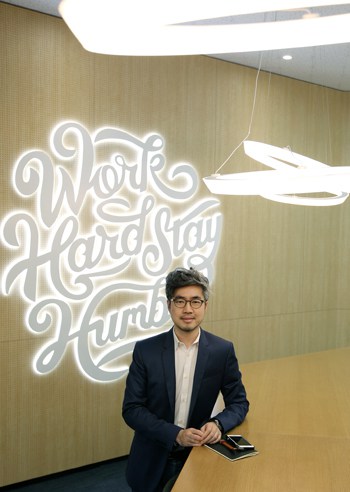
Jeffrey Lim is head of Google Campus Seoul.
Korea.net sat down with Jeffrey Lim, head of Campus Seoul, to hear what he has planned for the center.
– Google Campus Seoul is the first in Asia. Why did you establish Google Campus in Seoul?
Google has a “Google for Entrepreneurs” team to support startups. There are already Campus London and Campus Tel Aviv, and Campus Seoul is the first in Asia. Asia’s startup market is something we definitely don’t want to miss. Most of all, Seoul’s startup community is very dynamic, considering not only the number of startups but also how active investors are. Another important criterion was whether startups are willing to enter the global market. The biggest benefit that startup companies can get from Google in the end is that we can help them enter overseas markets. Other key criteria were whether many startups exist and can take advantage of such assistance from Google, and whether Google’s country subsidiary has enough resources to provide support for startups.
– What are business prospects like in Korea? As in, long-term prospects?
Over the past three to four years, the number of startups has continued to increase every year. The amount of investment is also growing rapidly. Last year alone, KRW 1.5 trillion was invested in startups. There were many achievements, as well. Over the past five years, startups like Ticket Monster, Coupang, SundayToz and Baedal Minjok have all become very successful. Considering that there are many talented people in Korea and venture capital companies, and that the government continues to support startup companies, this kind of growth is expected to continue. The next step would be to have Korean startup companies that can compete in the domestic market, but which can also compete with their overseas counterparts.
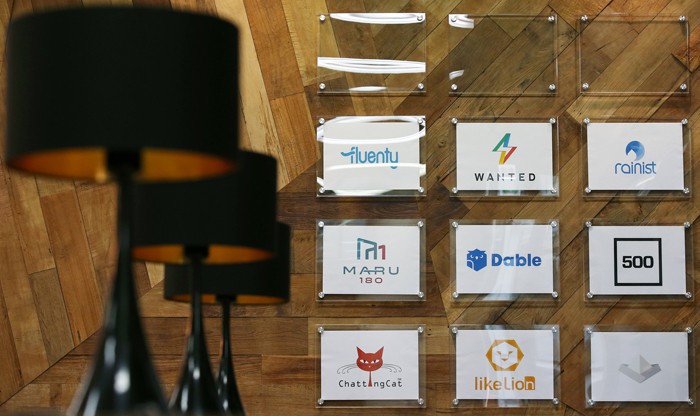
Logos for startup companies and partners at Camus Seoul are displayed on the wall.
– In what areas of Campus Seoul would you invest?
It is important to help individual startups grow, but Google’s bigger goal is to develop a startup community. In addition to providing desks and office space, we intend to help the entire ecology of startups develop. We want to help each of the entrepreneurs, lawyers, incubators and accelerators, among others, grow. Once there is a sustainable and healthy startup community, it will continue to develop for a long time. We also try to make connections between Asian and global entrepreneurs and startup communities.
– Campus Seoul was established in close partnership with the Korean government. Do you have the need for such support, or any requests?
We have worked closely with the Korean government over the past three to four years. We jointly tried to find promising local startups and let the world learn about them through the “Global K-startup” program. We have exchanged many ideas on how to further globalize local startups. We’ll continue to discuss how to help startups develop. There are more Centers for a Creative Economy and Innovation springing up in the country and we will provide ideas how to operate them more efficiently.
– The concept of a campus is very unique. There is little boundary between business and school. Does Google intend to share education and knowledge with startups in the future?
It is similar, in a way. Google itself started in a garage. In order to continue such a spirit, we intend to make the campus a habitat for entrepreneurs to develop and grow. That is our goal, but how it is implemented is a little different. Our goal is to create a startup ecology rather than doing it all by ourselves. We want each and every member of the startup community to grow by themselves. We are jointly conducting educational programs with our partners. We will start a coding education program in partnership with Likelion, a group of programmers, this summer because it has the most experience and knowledge in the area. Maru 180, an operator of space for startups, is managing Campus Seoul on behalf of Google because it has more knowhow in how to run a space for startups.
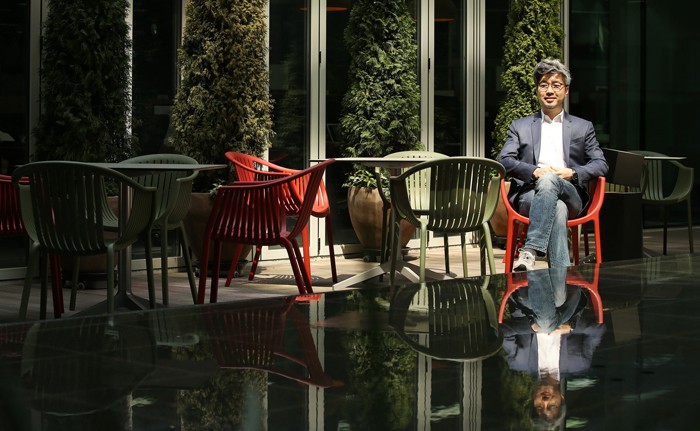
Jeffrey Lim, head of Campus Seoul, says that the goal of the campus is to become an Asian technology hub, a base for startup companies from across the continent.
– Two people started Google 17 years ago. There seems to be no end to Google’s expansion. What is the ultimate goal of Google? What is it trying to achieve with Campus Seoul?
We hope that Campus Seoul will develop into an Asian technology hub. We hope that Campus Seoul will be the first place to be if someone wants to do business in Korea or in Asia. Just as people go through immigration at the airport, I expect Campus Seoul to be the place where people get all the necessary information, become connected and do business.
– The “baby-friendly startup school” seems like a good idea. What is the reason behind encouraging mothers and more women to take part in the startup community?
A balanced sex ratio is important to form a healthy community. There are many talented female entrepreneurs, and we thought there shouldn’t be barriers for them to start a company. We wanted to lower the barriers. There are startup programs for women, such as the monthly Women Entrepreneur Breakfast Meeting. The “Campus for Moms” program will start in June. It consists of educational sessions on how to start a company and will be held once every week. Mothers can bring their kids to the program.
– There is a kitchen, a cafeteria and shower facilities at Campus Seoul. It sounds like you’re telling employees that they shouldn’t waste time outside, but should stay at the campus and take care of everything that needs to be done. Although it sounds practical, it seems like they are trying to make employees too-attached to their company.
This is mostly for practical reasons. It is one thing we learned operating Campus London. Startup companies on the campus wanted to have shower facilities because employees often worked very late. Google does many experiments and often fails. Over the past three years, we have had many experiments in London, and we created Campus Seoul based on those results. We are doing many experiments at Campus Seoul, and if they turn out OK, we intend to reflect them. The “Campus for Moms” program started small in Tel Aviv and then it was officially launched in London. Three hundred people graduated from the program in London and 100 startups were launched.
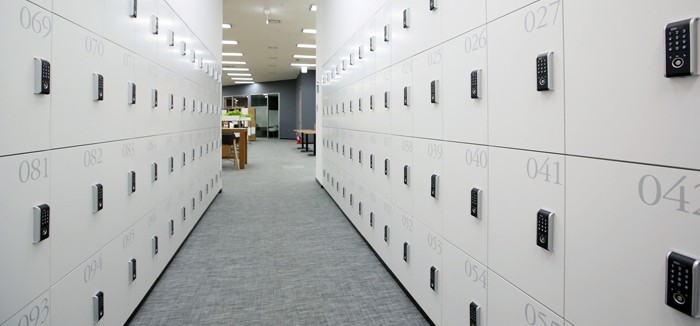

Lockers for employees (top) and a multipurpose room with a small stage (bottom) can be seen at Campus Seoul.
– Google’s success is expected to continue. What kind of innovation strategies does Google have to keep its lead?
Google supports startups around the world through its Google for Entrepreneurs and campuses. We believe that the kind of innovation created by startups can change the world. By supporting startups directly and indirectly, Google can itself innovate.
– Google and YouTube, as information search and knowledge sharing platforms, have brought enormous changes. We look forward to a new kind of expansion in Seoul. Do you have any advice for Korean entrepreneurs?
Our ultimate goal is to enter the global market. It is not necessarily about entering other nations, but we want entrepreneurs to have bigger dreams, on a global scale. I hope that they will rather have higher dreams and continue to innovate and grow toward larger markets, than stay in a certain market or rely on a certain technology. I want to tell them that it will be okay to have bigger dreams and make bold challenges.
By Limb Jae-un
Photos: Jeon Han
Korea.net Staff Writers
jun2@korea.kr























